
Marcello Vincenzo Domenico Mastroianni was an Italian film actor and one of the country's most iconic male performers of the 20th century. He played leading roles for many of Italy's top directors in a career spanning 147 films between 1939 and 1996, and garnered many international honours including two BAFTA Awards, two Best Actor awards at the Venice and Cannes film festivals, two Golden Globes, and three Academy Award nominations.
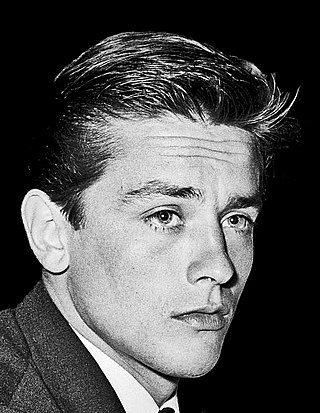
Alain Fabien Maurice Marcel Delon was a French actor, film producer, screenwriter, and singer. Acknowledged as a cultural and cinematic leading man of the 20th century, Delon emerged as one of the foremost European actors of the 1960s, 1970s, and 1980s, and became an international sex symbol. His style, looks, and roles made him an icon of cinema worldwide and earned him enduring popularity. Delon achieved critical acclaim for his roles in films such as Women Are Weak (1959), Purple Noon (1960), Rocco and His Brothers (1960), L'Eclisse (1962), The Leopard (1963), Le Samouraï (1967), The Girl on a Motorcycle (1968), La Piscine (1969), Le Cercle Rouge (1970), Un flic (1972), and Monsieur Klein (1976). Over the course of his career, Delon worked with many directors, including Luchino Visconti, Jean-Luc Godard, Jean-Pierre Melville, Michelangelo Antonioni, and Louis Malle.
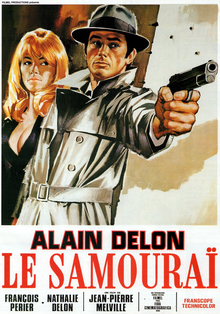
Le Samouraï is a 1967 neo-noir crime thriller film written and directed by Jean-Pierre Melville and starring Alain Delon, François Périer, Nathalie Delon, and Cathy Rosier. A Franco-Italian production, it depicts the intersecting paths of a professional hitman (Delon) trying to find out who hired him for a job and then tried to have him killed, and the Parisian commissaire (Périer) trying to catch him.

Monica Vitti was an Italian actress who starred in several award-winning films directed by Michelangelo Antonioni during the 1960s. She appeared with Marcello Mastroianni, Alain Delon, Richard Harris, Terence Stamp, and Dirk Bogarde. On her death, Italian culture minister Dario Franceschini called her "the Queen of Italian cinema".
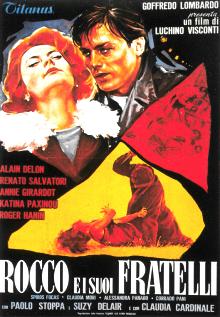
Rocco and His Brothers is a 1960 drama film directed by Luchino Visconti and starring Alain Delon, Annie Girardot, Renato Salvatori, Katina Paxinou, Roger Hanin, Paolo Stoppa, and Claudia Cardinale in one of her early roles. Set in 1960 Milan, it tells the story of a migrant family from southern Italy and its disintegration in the society of the industrial north.

Renato Salvatori was an Italian actor.

La Notte is a 1961 Italian drama film directed by Michelangelo Antonioni and starring Marcello Mastroianni, Jeanne Moreau and Monica Vitti. Filmed on location in Milan, the film depicts a single day and night in the lives of a disillusioned novelist (Mastroianni) and his alienated wife (Moreau) as they move through various social circles. The film continues Antonioni's tradition of abandoning traditional storytelling in favor of visual composition, atmosphere, and mood.
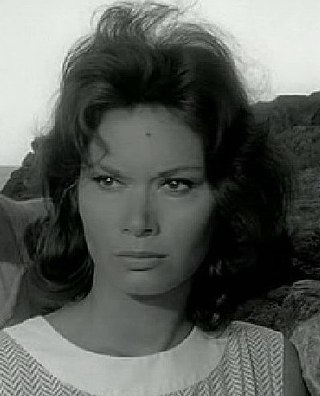
Anna Maria Massetani, known professionally as Lea Massari, is an Italian actress and singer.

The Unvanquished is a 1964 film noir directed by Alain Cavalier and starring Alain Delon opposite Lea Massari.
Benoît Ferreux is a French film, television and stage actor who is possibly best recalled internationally for his role in the 1971 film Murmur of the Heart.
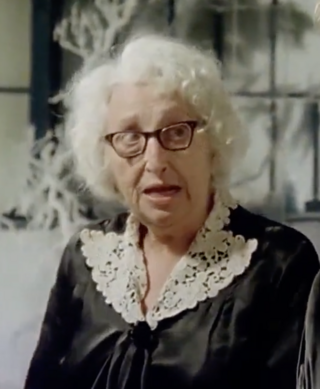
Liana Del Balzo was an Italian film actress. She appeared in 90 films between 1935 and 1979. She was born in Buenos Aires, Argentina, and died in Rome, Italy. Even making her film debut quite late, in her forty, Del Balzo was one of the most active character actresses in the Italian cinema, usually cast in humorous roles. She was also active on stage and in the operetta, in which she met her husband-to-be, the tenor Guido Agnoletti.

Adalberto Maria Merli is an Italian actor and voice actor.
Raffaello "Lello" Baldini, was an Italian poet in the Romagnol language.

Salvatore Randone, known professionally as Salvo Randone, was an Italian stage, film and television actor.
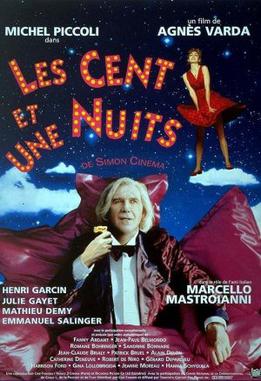
One Hundred and One Nights is a 1995 French comedy film directed by Agnès Varda. A light-hearted look at 100 years of commercial cinema, it celebrates in vision and sound favourite films from France, Germany, Italy, Japan, and the USA. It was entered into the 45th Berlin International Film Festival.

Borsalino is a 1970 French gangster film directed by Jacques Deray and starring Jean-Paul Belmondo, Alain Delon and Catherine Rouvel. It was entered into the 20th Berlin International Film Festival. In 2009, Empire named it No. 19 in a poll of "The 20 Greatest Gangster Movies You've Never Seen… Probably". A sequel, Borsalino & Co., was released in 1974 with Alain Delon in the leading role. The film is based on real-life gangsters Paul Carbone and François Spirito, who collaborated with Nazi Germany during the occupation of France in World War II.

La Piscine is a 1969 psychological thriller film directed by Jacques Deray, starring Alain Delon, Romy Schneider, Maurice Ronet, and Jane Birkin.

Sonia Petrovna is a French dancer, of Russian descent. She is an actress and theatre director. Petrovna was born in Paris. Between the age of 6 and 14 she studied dance at the Paris Opera Ballet and on the initial invitation of Roland Petit went on to appear in various ballet productions. Her most famous early acting roles were those of Vanina Abati in La prima notte di quiete, acting alongside leading French actor Alain Delon, and as Princess Sophie in Ludwig alongside leading actors Helmut Berger, John Moulder Brown and Romy Schneider, both in 1972.

Krista Nell was an Austrian film actress.

















